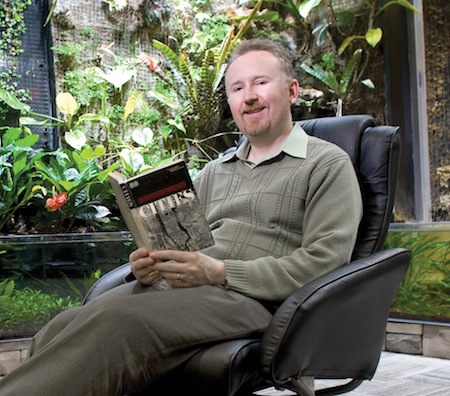
Professor Chris Kennedy
In a commentary published in the Oct. 30th edition of the journal Nature, Civil Engineering Professor Chris Kennedy (CivE) and colleagues warn garbage is being generated faster than other environmental pollutants, including greenhouse gases.
The researchers say that ‘business-as-usual’ projections, based on population growth and gross domestic product (GDP), will see us generate more than six million tonnes of solid-waste a day by 2025. That’s enough to fill a line of garbage trucks 5,000 kilometres long every day.
“This means greater numbers of people having to live in environments that are degraded due to the effects of trash,” said Kennedy.
Kennedy wrote the commentary along with lead author Daniel Hoornweg, associate professor of energy systems at the University of Ontario Institute of Technology in Oshawa and Perinaz Bhada-Tata, a solid-waste consultant in Dubai, United Arab Emirates.
“Waste doesn’t get on the map in terms of threats to our planetary system in the way greenhouse gases and ozone do,” said Kennedy.
But the problem isn’t just the waste itself, he added, but also the energy and resources required to make the products we throw out.
And as he and his co-authors point out, population is the main reason we generate so much waste. In 1900, the world had 220 million urban residents and produced fewer than 300,000 tonnes of solid waste (such as broken household items, ash, food waste and packaging) per day.
By 2000, the 2.9 billion people living in cities were creating more than three million tonnes of solid waste every day.
The researchers also found that some countries generate more waste than others. Japan for example produces roughly one-third less garbage per person than the United States. This is despite the fact they have approximately the same GDP per capita.
The reason, the authors say, is Japan’s higher-density living, higher prices for a larger share of imports and cultural norms.
According to Kennedy, we need to act on two fronts – population growth and waste management – if we hope to curb our garbage production.
“Population is the ultimate driver here, and vulnerable, poor people tend to multiply faster,” he said. “So anything you can do to help urban poor, to give them more security, health and education, will stop the global population from growing so high.”
To better manage wastes, society needs to accelerate the adoption of practices of ‘industrial ecology’ – developing urban and industrial systems that conserve mass akin to natural ecosystems. A great example is the city of Kawaski in Japan, where firms are linked into an industrial ecosystem.
‘Peak trash’ – the year when garbage production is expected to reach a maximum – depends on how well we learn to curb our waste.
Kennedy and his co-authors write that richer North American and European cities could see peak trash by 2050 and Asia-Pacific countries by 2075. But they say waste will continue to rise in the fast-growing cities of sub-Saharan Africa.
“The urbanization trajectory of Africa will be the main determinant of the date and intensity of global peak waste,” they write.
“With lower populations, denser, more resource-efficient cities and less consumption (along with higher affluence), the peak could come forward to 2075 and reduce in intensity by more than 25 per cent. This would save around 2.6 million tonnes per day.”



